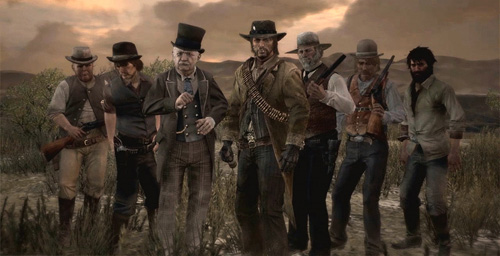We’ve talked about video game endings multiple times on this site, but I just had to bring the issue back up after reading an excellent article about today by Christian Higley over at Digital Hippo about How Video Games Fail to End.
In it, Higley explores the idea that many games fail at a very basic level of storytelling: narrative structure. While stories typically have a first, second and final act, most games end the game right after the second act, before the real conclusion can actually set in. Red Dead Redemption is one of the few games I can think of that actually gives gamers a third act (and does it to great effect), in that Marston is allowed to return home, and the player spends time winding the story down before its sad but powerful conclusion.
While that’s not a new argument, the writer goes a step further by pointing out that most games are even missing the first act, choosing instead to thrust players right into the second act. The more I thought about it, the more I realized how true it is: games typically begin at the “inciting incident”. It’s the equivalent of starting A New Hope at the very moment Luke’s aunt and uncle are killed. Or in many cases, even after that. Continue reading GamerSushi Asks: Do Games Fail at Endings?


 You guys keep asking for it, and because I’m a softy and I like you, we keep bringing it. It’s time for another Would You Rather. What we’ve been doing on the last few outings is focusing in on a specific genre, keying in on features to see what your gaming preferences are. I’ve said it before, but I love the responses that these things get, so I wanted to get a feel for how you guys lean when it comes to stories and plot in the world of video games.
You guys keep asking for it, and because I’m a softy and I like you, we keep bringing it. It’s time for another Would You Rather. What we’ve been doing on the last few outings is focusing in on a specific genre, keying in on features to see what your gaming preferences are. I’ve said it before, but I love the responses that these things get, so I wanted to get a feel for how you guys lean when it comes to stories and plot in the world of video games. Woah. So Uncharted 2 is one incredible game. If you have been on the fence about getting a Playstation 3 (or a PS triple, as some would say), you no longer have any excuses. Go out and get this game right now. I’m being serious. There will be punches if you ignore me on this.
Woah. So Uncharted 2 is one incredible game. If you have been on the fence about getting a Playstation 3 (or a PS triple, as some would say), you no longer have any excuses. Go out and get this game right now. I’m being serious. There will be punches if you ignore me on this.